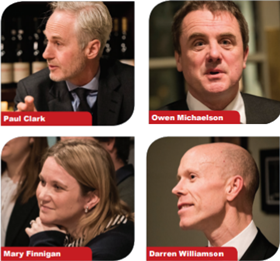The UK has charged into 2019 with a cacophony of noise around its impending exit from the EU.

With Theresa May still at odds with Europe and her own government, it is anyone’s guess what the country will emerge with on the other side of 29 March.
But despite the UK’s ongoing political turmoil, 2018 was a strong year for real estate, with high levels of investment from domestic and international buyers, a thriving occupier market and ever-increasing construction activity across the regions as their markets continued to mature.
While retail continued to struggle on with high street giants such as House of Fraser going under, investors increasingly turned their gaze to alternative sectors such as student accommodation and retirement living.
With this landscape in mind, Freeths Solicitors gathered a group of industry experts in London to talk about how they think 2019 will pan out for the UK.
Panel of experts
- Mary Finnigan, WeWork
- Steve Norris, Soho Estates and This Land
- Emma Goodford, Knight Frank
- Jo Allen, Frogmore
- Brian Bickell, Shaftesbury
- Tom Redmayne, WiredScore
- Chris Grigg, British Land
- Paul Clark, The Crown Estate
- Owen Michaelson, Harworth Group
- Darren Williamson, Freeths
- Liz Hamson, Property Week (chair)

All photos by Paul Burroughs
Let’s kick off with Brexit. How has our position changed since this time last year?
SN: I stand by what I said last year, which is when we leave, it will be more or less on the same terms that we currently enjoy. What we’ve done well is leaving the prospect of no deal on the table. It’s important that we maintain the possibility that we could drift into no deal because the only body that’s more terrified of that prospect than us is the EU 27. And therefore, at some point, the EU will say: “For God’s sake – give them something.”

BB: I think we’ll spend the next 10 years trying to do the difficult part of this exit because I see Mrs May’s been given an exam paper with 10 questions on and she’s done the first one. The EU has an incentive to keep the club together and they may not be as generous to us.
SN: I absolutely disagree with your prediction of 10 years of chaos. The vast majority of the regulations are very straightforward and will be agreed in a relatively short time.
But there’s a feeling that everyone is holding back until things look a bit more certain, so do you think the market will see a Brexit bounce?
JA: But Korean and Japanese investors are saying they’ve been following the UK; they haven’t done much here in the last two years but now they’re ready, because they think there is market correction coming and we’re at the top of the cycle.

And what’s the interest from investors – do they want the trophy office buildings or are they looking elsewhere? Industrial or the regions, for example?
OM: Yes, money has moved out to the regions, but most international investors still stick to the trophy assets and stay in London.
EG: But the regional markets are becoming much more mature, and I think at the end of the day it’s going to become a question of availability of stock.
CG: I do think that when I think about the last decade of capital allocation, we forget how much bigger than us the really big sovereign and pension funds have become. If you go and talk to these people, you can see that amazing growth in wealth in the organisations. The second thing you should see is a shift away from country allocations to gateway city allocations. I speak to a lot of people who will say: “Manchester? Where is that? I’m interested in Boston, New York, London and Hong Kong.”

JA: And funds are moving into alternative sectors now, things that have known demand. That’s why student housing and the healthcare sector are becoming more mainstream. I think they are moving up the risk curve a bit to get returns.
MF: But just how how quickly are these traditional investing institutions changing their mindsets regarding what constitutes mainstream and what constitutes alternative?
CG: They’re not traditional though. A bit like the iPhone, they are only now really just beginning to exist but now they dwarf most old-style asset managers. They’re thinking differently every day, and in my experience they think much more top-down.
EG: I don’t think they’re agonising over Brexit either, because they’re not confusing the weather and the climate. They are taking longer-term views of where they want to place money over an extended period of time. A more important thing to talk about is how technology and social demographics are going to change because this will have a much more profound effect on the type of income streams we get from investors in the next 10 to 15 years. AI, for example, will fundamentally change how we use buildings and cities, who works in them and how we live.
And what are the alternative asset classes that will come to the fore and graduate to the next level?
TR: I think build-to-rent is very interesting, particularly the way that institutions are coming in and having to look at the B2C market rather than the B2B and having to totally flip how they’re positioning themselves to customers and renters. Look at what WeWork has been up to in the last few years, taking a B2C approach in terms of how they humanise what that experience can be. A lot of landlords on the office side are seeing this engagement with customers and taking their own to the next level.
Find out more - WeWork boss shrugs off SoftBank setback with rebranding and expansion into residential
MF: I totally agree. It’s about dealing completely with what the end user wants; reacting to consumer demands and being close enough to them to see that. Our whole community staff is immersed with membership in the buildings so we’re nimble enough to change how we do things weekly if the demand were to change that quickly.
What about co-living? Is that going to take off?
MF: With increasing urbanisation, yes. I think we will see more and more co-living.
SN: I’m a big fan of The Collective. There are people there full time and they run events for the tenants; the launderette is a disco! I really think it’s going to be a big thing.
CG: I think we are moving away from the idea that we are ‘the landlord’ as opposed to a customer-focused business. We set up Storey to make ourselves more customer facing; even only a decade ago, that was revolutionary. So I think the next trend will be that this industry will either adapt or be blown away by companies that do that.
Find out more - Storey flexible workspace: success Storey
MF: In order to get our heads around this as an industry, I think we need to very quickly introduce more diversity of thought.

EG: The very first thing you have to do is to understand the people who use your buildings and work in them, visit them, shop in them. And for that you need data. And for data you need a platform. We have been recruiting people who understand data digital platforms and hospitality and you end up thinking things from the inside out. We used to think, and we haven’t got over this quite yet, if you wanted a successful development in central London you start with the architecture. Now, we’re starting with how the building works.
On diversity, we’ve made more headway on getting women into the industry. The LGBT is coming on relatively well from a very low base. But I don’t see anything on ethnic diversity and on social diversity I don’t see much…
EG: At the moment, you need a university degree to get into real estate. That will cost you £30,000 so you’re either racking up debt or mum and dad are paying for it, and if that’s the case then you come from a comfortable background, typically. And the industry can only select from the people it is presented with. Until we say you don’t need a degree, come as an apprentice from all walks of life, we’re going to see chartered surveyors of a middle-class background.
TR: I think technology will be a great equaliser but I think it also has the potential to create a new social class on a global basis. A lot of existing problems are a result of deindustrialisation, technology taking over a lot of things and people have to either retrain or they have a set or skills that has not allowed them to keep on working. However, I think technology is also going to mean that it’s not just privately educated people that are going to come through; it’s much more equalising on where you can build that potential from.
PC: So should we assume that this technological change will do what the others have done for the last 300 years? Will new jobs that we don’t yet know about be created to replace the old ones?

TR: I will do five jobs in my lifetime that don’t even exist yet. The job that I do now didn’t exist five years ago. My father told me to go get a qualification and a career and success would look like working for the same company for 40 years. And that’s changing now. I think real estate faces a huge challenge because all of you around the table deal with illiquid assets they take a while to plan and build and to let up and then the model is to keep an income stream for 40 years until you have to do again. And it’s really difficult to change that, while the way in which people live and work is changing so quickly, mainly due to technology. The buildings can’t change as quickly as they need to.
DW: Absolutely. It’s all about timing. It takes time to change people’s attitudes and so the way people live is changing more rapidly than the real estate industry
OM: But if you’ve got a building that’s 300 years old then it can be adapted. The actual problem is the people and the attitude of the overall workforce – I still think as an industry we’re 10 or 20 years out of date with the rest of the world. To me the building’s there and static; we just have to allow people to use them in a flexible way.
TR: But surveyors won’t change real estate. It will be people from outside the industry. Uber was not started by a taxi driver. The people who change real estate will come in, look at it from a different background and say “why does it happen like that?”
Is retail an example of where that disruptive thinking has already happened?
PC: No matter how much retail spending goes online, the role of a destination changes. At Regent Street, we spent a decade taking it from 200 to 100 shops because bigger units with the full range of what the retailer sells was how you competed with online. The opposite is true now, but they’re not coming out of the traditional retail sector. Lots of brands want to have a more interactive relationship with their customers and they need physical space to do it.
But it’s a radical rethinking of the high street, isn’t it, because you’re taking out half the stuff that was retail and repurposing that?
BB: What we’re all missing here is the logistics that sit behind retail. If a shop doesn’t have your size, they’ll send it to wherever you want the next day – retail is very joined up. The fundamental problem is they don’t need a big store and they don’t need to be in every location. But the best locations will survive.

JA: I think there are some good retailers that went to the wall because it wasn’t affordable. The rents were too high, then the business rates hit but they were probably selling good things that people wanted. In this world, only the most nimble and outward looking are the ones that will do the best.
MF: I think that those who survive it will need to know their end user so well that they can anticipate and change with them.
TR: Adapting quickly is key and I think there has been a fundamental shift in offices as well. WiredScore has grown from a two- to a 30-person business over three years and we would never consider taking anything more than a two-year lease; we’re already outgrowing our current space, so it would make no sense. There has been a shift in technology that is influencing leasing, which I think very few people think about. I have a friend that runs a fintech company that could double its server space overnight with the click of a button and minimal costs. So you can grow in terms of people pretty quickly; your technology can now adjust very quickly in size, but your real estate can’t.
What about the lending environment? How is that looking? Is debt still readily available in the UK?
OM: I’d have said yes until this morning when one of our customers said they were finally seeing signs of all the investment funds just pausing. That hadn’t been our experience, but I think in these last few weeks before Brexit you’re not going to be criticised for doing nothing so lenders may have just pressed pause.
CG: One place where I think our industry could be hit is construction, because big constructors are where the bank pressure has been. If you look at the constant various failings of that sector and related sectors, that’s the place I’d worry about.
Let’s have a final prediction for the year from everyone to conclude…
TR: I think we will see landlords becoming increasingly consumer focused and becoming obsessed with tenant experience.
EG: I think we are heading quickly for a supply crunch but occupier demand is reasonably confident and I think that will continue. If we do get a bit of a Brexit bounce in confidence, we’re in for a brilliant year this year.

PC: I think depressingly we will have the same discussion about diversity in the industry in 12 months’ time that we’ve just had because we’re not really addressing the real issues there.
JA: The most nimble multi-sector investor will be the most successful. You’ve got to look at all this disruption and find opportunity where you can, and you will.
DW: I think when we sit down next year we’ll be talking about how swiftly technology has come on and how much of it is constantly changing the industry.
BB: Brexit shenanigans won’t go away but we should make sure we don’t distract ourselves from the challenges from the very traditional real estate industry.
MF: I think there will be a lot of thought given to impact value and propcos will start giving more thought to experience.
OM: It’s don’t panic and keep trading through. Keep doing what you do. Will people still be buying houses in 12 weeks? Yes they will. So we have to keep going.
SN: We will be asking ourselves what all the fuss was about this time last year and life will be remarkably similar. I think this idea of much more customer focus will be an inevitable trend.































No comments yet